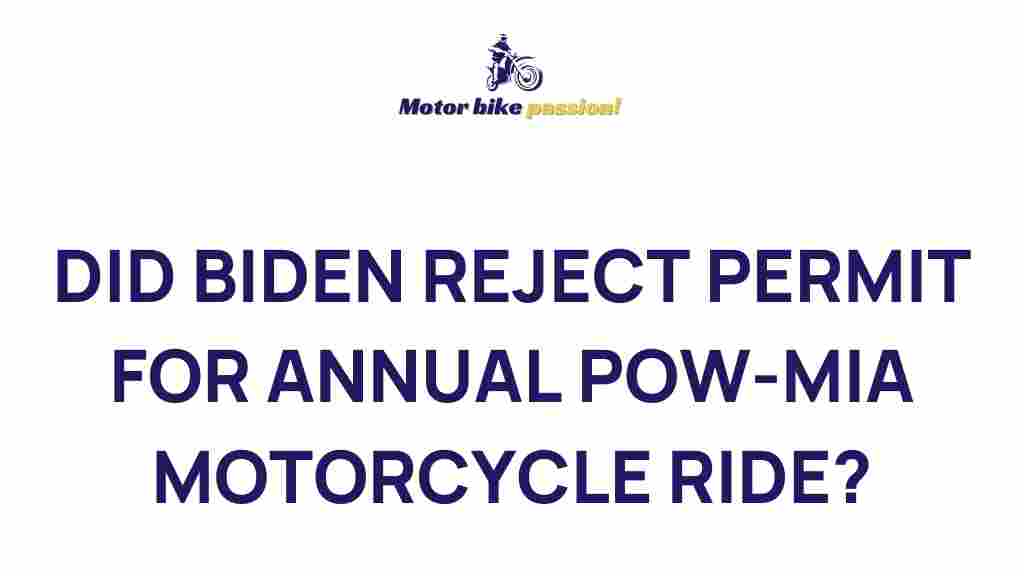Mystery Unveiled: The Annual POW-MIA Motorcycle Ride Permit Rejection
The Annual POW-MIA Motorcycle Ride has long been a cherished tradition, bringing together veterans, families, and supporters to honor those who remain unaccounted for from past conflicts. However, recent years have seen a rise in permit rejections for this iconic event, leaving many to wonder what is causing these denials. In this article, we’ll explore the intricacies behind the permit process, the reasons for rejection, and how organizers can navigate the challenges to keep this tradition alive.
The Importance of the Annual POW-MIA Motorcycle Ride
This annual event isn’t just a ride—it’s a symbol of remembrance and solidarity. For decades, it has provided a platform for raising awareness about the plight of Prisoners of War and those Missing in Action. Participants view it as more than a gathering; it’s a commitment to ensuring that no one is left behind.
Despite its noble cause, the increasing difficulty in obtaining permits has cast a shadow over the ride. To understand the issue, it’s essential to delve into the complexities of event permitting and the potential reasons for the denials.
Understanding the Event Permitting Process
Securing a permit for a large-scale event like the Annual POW-MIA Motorcycle Ride involves several steps:
- Application Submission: Organizers must complete a detailed application outlining the event’s purpose, route, and safety measures.
- Coordination with Authorities: Approval often requires coordination with local police, fire departments, and municipal agencies.
- Insurance and Compliance: Proof of insurance and adherence to traffic and safety regulations are mandatory.
- Public Feedback: In some cases, authorities solicit input from residents and businesses in the affected areas.
Despite following these steps diligently, organizers of the annual ride have faced unexpected hurdles. Let’s examine the possible reasons behind the permit rejections.
Key Reasons for Permit Rejections
Several factors may contribute to the denial of permits for the Annual POW-MIA Motorcycle Ride:
- Safety Concerns: Authorities may reject permits citing inadequate safety measures or risks posed to participants and the public.
- Traffic Disruptions: Large-scale rides can cause significant traffic disruptions, leading to opposition from local businesses and residents.
- Resource Limitations: Municipalities might lack the manpower or resources to support the event.
- Political or Social Factors: Changing political climates or public sentiments might indirectly influence decisions.
Understanding these reasons can help organizers better prepare for future applications and address potential objections in advance.
Strategies for Overcoming Permit Challenges
To ensure the continuation of this cherished annual event, organizers can implement the following strategies:
1. Strengthen Safety Protocols
Develop a comprehensive safety plan, including:
- Designating route marshals and traffic controllers.
- Collaborating with local law enforcement for escort services.
- Providing first aid stations and emergency response teams.
2. Engage the Community
Building community support can make a significant difference:
- Organize town hall meetings to address concerns.
- Partner with local businesses to highlight economic benefits.
- Launch awareness campaigns to garner public backing.
3. Advocate at the Political Level
Sometimes, the roadblock is political. Reaching out to sympathetic elected officials or veteran organizations can help advocate for the cause. For instance, collaborating with groups like the Veterans of Foreign Wars (VFW) can amplify the event’s importance.
Common Pitfalls and How to Avoid Them
Even with the best intentions, certain missteps can derail permit approvals:
- Incomplete Applications: Ensure all documentation is thorough and error-free.
- Failure to Address Previous Concerns: Review feedback from past applications and incorporate necessary changes.
- Last-Minute Submissions: Apply well in advance to allow time for revisions and follow-ups.
By proactively addressing these issues, organizers can increase their chances of approval for this pivotal annual event.
Looking Forward: Preserving the Legacy
Despite the challenges, the resilience of the veteran community and its supporters ensures that the spirit of the Annual POW-MIA Motorcycle Ride endures. The event serves as a solemn reminder of the sacrifices made by countless individuals in service to their country. Ensuring its continuity requires collective effort, from organizers and participants to local governments and the public.
If you’re interested in learning more about how other communities successfully host large-scale events, check out our guide on navigating complex permitting processes.
Conclusion
The permit rejections for the Annual POW-MIA Motorcycle Ride might seem like a daunting obstacle, but they also present an opportunity to innovate and strengthen the event’s foundation. By understanding the reasons behind denials, addressing concerns proactively, and engaging stakeholders at every level, organizers can overcome these challenges and ensure the ride’s legacy continues for generations to come.
This annual tradition is more than a journey—it’s a mission to remember, honor, and inspire. Let’s work together to keep the wheels turning.
This article is in the category Reviews and created by MotorBikePassion Team
